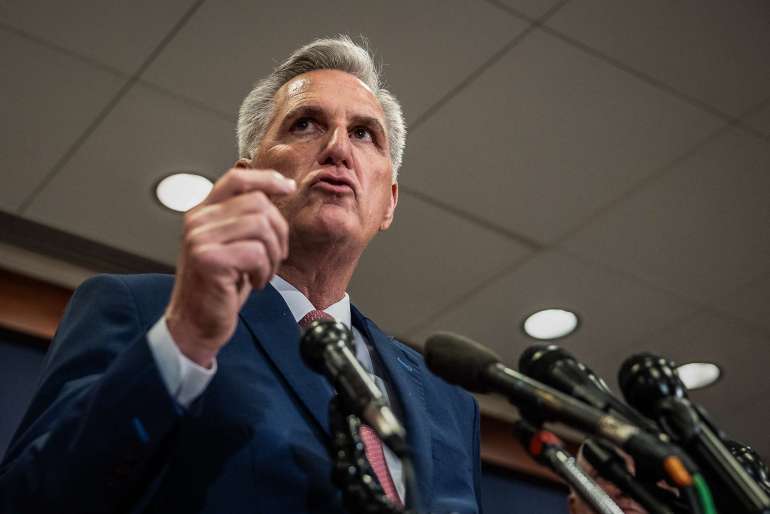McCarthy’s next step on the GOP tightrope: Navigating concessions to conservatives

More than 50 members of the Republican Main Street Partnership met on Wednesday morning to discuss their legislative priorities and how they plan to flex their muscle as the second-largest GOP group on Capitol Hill, a Republican familiar with the sitdown told POLITICO.
Meanwhile, some GOP lawmakers who backed McCarthy on Tuesday might end up siding with Freedom Caucus members on the rules concessions they’re seeking. Among those requests: tools to undermine the GOP leader, including a restoration of the speaker-deposing move known as a “motion to vacate the chair”; and diluting the influence of McCarthy and his allies in doling out committee assignments. (The more influence McCarthy loses there, the fewer carrots he has to offer to his skeptics.)
Rep. Jim Jordan (R-Ohio), a onetime McCarthy opponent turned key ally, threw his support behind conservatives’ proposed rules changes, calling them “good, common-sense things.”
On top of that, some Republicans walked into Wednesday’s debate with a hangover from Tuesday. Four lawmakers, speaking on condition of anonymity, aired frustration after the leadership elections about what they described as a chaotic and poorly explained process of tallying votes.
Those private complaints about GOP Conference Chair Elise Stefanik’s (N.Y.) management of the voting were exacerbated by the fact that inside the room, she read out votes for McCarthy and Biggs but did not mention that six members chose neither candidate. According to conference staff, however, internal rules state that only formally nominated leadership candidates — in this case, McCarthy and Biggs — have their tallies publicly announced.
Separately adding to the disarray, at least one GOP lawmaker mixed up planned votes for the first and second ballots in the highly competitive whip race, according to a senior Republican who was in the room. The lawmaker in question intended to choose Rep. Drew Ferguson (R-Ga.) for the first ballot, but instead put Rep. Tom Emmer (R-Minn.).
That one vote, had it been cast as intended, could have led to a different outcome in the whip battle — since Ferguson ended the first ballot one vote behind Emmer, eliminating him from the contest before the current National Republican Congressional Committee chair prevailed on the second ballot against Rep. Jim Banks (R-Ind.).
Now Republicans hope to move beyond the drama — though it’s more likely they just start the second act — as McCarthy starts to try to lock down votes.
He can’t lose more than a handful of members. Though the House hasn’t formally been called yet, Republicans are expected to have a single-digit majority. And McCarthy has already lost two: Shortly before Wednesday’s conference meeting, Rep. Matt Rosendale (R-Mont.) appeared to put himself firmly in the “no” column.
“[McCarthy] wants to maintain the status quo, which consolidates power into his hands and a small group of individuals he personally selects. We need a leader who can stand up to a Democrat-controlled Senate and President Biden, and unfortunately, that isn’t Kevin McCarthy,” Rosendale said.
He joins Rep. Matt Gaetz (R-Fla.), who is pushing Jordan as a potential speaker contender and cast doubt on McCarthy’s chances of ultimately claiming the gavel: “Kevin McCarthy couldn’t get 218 votes, he couldn’t get 200 votes. He couldn’t get 190 votes.”
Other McCarthy opponents also appeared unbowed, calling for challengers to the California Republican to step forward.
Biggs signaled that he won’t challenge McCarthy again — wondering “how many times can you have a target on your back” — but said that House Republicans “still have a lot of things to discuss internally,” including the speakership.
Rep. Bob Good (R-Va.), who opposed McCarthy, said the current leader’s failure to reach 218 internal votes “opens up the opportunity for anyone interested to let us know what their vision is to fight for the things that matter most to the American people.”
McCarthy’s allies squashed or punted several conservative amendments on Wednesday afternoon, with largely non-controversial proposals — like backing the full reopening of the Capitol grounds — getting through on voice vote.
“I don’t think those of us who were seeking to change how Congress operates, felt like the leadership was supportive of that. … It was clear that the conference leadership had lined up opposition,” Good said after the meeting.
And in a blow to members of the Freedom Caucus who wanted to make it easier to depose a speaker, House Republicans instead agreed to language requiring that a motion to vacate the chair have the support of a majority of the conference.
“There was an initiative for the last month or two saying we want to make it easier to vacate the chair and that just puts us on a house of cards,” said Rep. Don Bacon (R-Neb.).
Bacon added that where the conference ended up “gives us stability, predictability, and that’s a good thing.”
Nancy Vu contributed to this report.